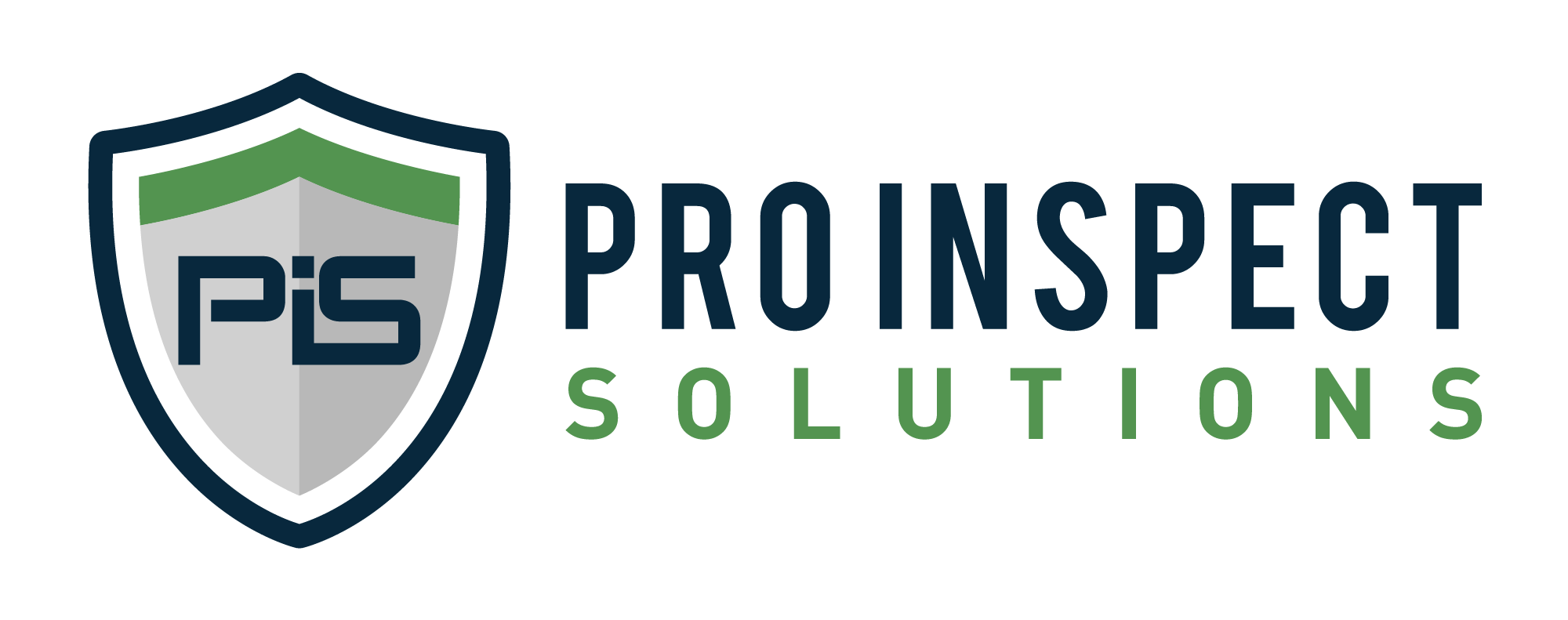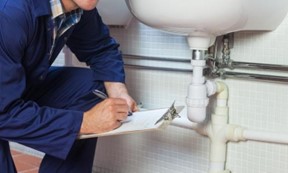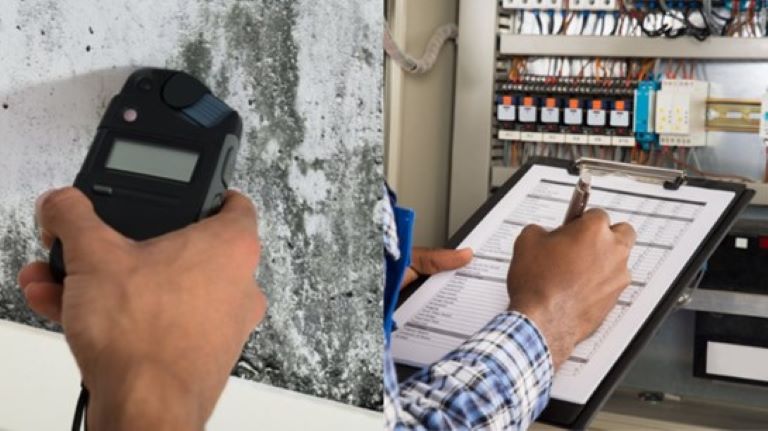
Defects That Could be Haunting Your Home
Mold to Electrical Hazards:
Defects That Could Be Haunting Your Home
It’s that time of year, tales of haunted houses are sure to be on everyone’s mind. But for homeowners, there are far scarier things lurking behind the walls and beneath floors, spooky defects that could truly haunt your house! These hidden hazards can lead to costly repairs and even endanger your health and safety. From mold creeping through your walls to faulty wiring sparking electrical fires, let’s explore some of the most frightening home defects and how to protect yourself from these real-life horrors.
Mold: The Sinister Spores
Mold may not sound as scary as a ghoul or goblin, but it can be just as menacing to your home and health. Mold thrives in damp, humid environments and can spread quickly if left untreated. It’s often found in basements, attics, bathrooms, and even inside walls, especially in homes that have experienced water damage.
Why It’s a Problem
Mold spores can lead to various health issues, including respiratory problems, asthma attacks, and allergic reactions. Inhaling these spores can trigger symptoms and exacerbate existing conditions, making it essential to address mold issues promptly.
Additionally, mold weakens the structure of your home by feeding on organic materials like wood, drywall, and insulation, leading to costly repairs and compromising the integrity of your living space.
Prevention Tips
To prevent mold growth, install dehumidifiers in damp areas such as basements and bathrooms to reduce humidity levels. Address any leaks immediately and ensure proper ventilation in moisture-prone spaces to allow air circulation. If you suspect hidden mold in your home, schedule a professional mold inspection to identify and remediate the problem before it escalates. Taking these proactive steps can help safeguard your health and home from the creeping menace of mold.
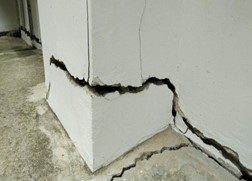 Foundation Cracks: The Silent Sinking
Foundation Cracks: The Silent Sinking
A cracked foundation can be one of the most expensive and dangerous defects in a home. Cracks can allow water to seep into your basement, which can cause mold growth,structural damage, and even foundation shifting. Over time, a house with a failing foundation may begin to tilt, sink, or collapse.
Why It’s a Problem
Foundation cracks pose a significant threat to the structural integrity of your home, potentially leading to costly repairs. If left unaddressed, these cracks can widen, allowing water to infiltrate your basement, which may result in mold growth and pest infestations. Over time, a failing foundation can cause your house to tilt, sink, or even collapse, creating safety hazards for you and your family.
Prevention Tips
To prevent foundation issues, regularly inspect your foundation for any signs of cracks or shifting, addressing concerns as soon as they arise. Keep your gutters clean to prevent water from pooling around the foundation, and ensure proper grading around your home to direct water away from the structure. Taking these proactive measures can help maintain the stability of your foundation and protect your home from severe damage.
Electrical Hazards: The Cursed Circuit
Faulty wiring is one of the most dangerous defects that can haunt your home. Aging electrical systems, overloaded circuits, and DIY wiring projects gone wrong can all lead to electrical fires, which claim the lives of thousands of people each year.
Why It’s a Problem
Electrical hazards pose a significant risk to your home and family, as faulty wiring can lead to electrical fires that ignite without warning and spread rapidly. These fires endanger lives and can cause devastating damage to your property. Common signs of electrical issues, such as frequent circuit breaker trips, flickering lights, and burned outlets, indicate potential fire hazards that should not be ignored.
Prevention Tips
To prevent electrical hazards, have a licensed electrician inspect your wiring regularly, particularly if your home is older or you notice any signs of electrical problems. Avoid overloading outlets and power strips to reduce the risk of circuit failures. If you live in an older home, consider upgrading your electrical system to accommodate modern appliances and prevent overloading outdated wiring. Taking these steps can help keep your home safe from electrical fires.
Plumbing Leaks: The Drip of Doom
Water leaks might seem minor at first, but they can quickly turn into a homeowner’s nightmare. Leaks can occur behind walls, under floors, or beneath sinks, leading to water damage, mold growth, and structural decay.
Why It’s a Problem
Undetected leaks can lead to serious consequences, including structural rot and mold infestations that compromise the integrity of your home. The resulting water damage can be costly to repair, often ruining flooring, drywall, and personal belongings, making it essential to address any signs of leaks promptly.
Prevention Tips
To prevent plumbing leaks, regularly inspect areas prone to water exposure, such as under sinks, around toilets, and near water heaters, for any signs of moisture. Ensure your home’s plumbing system is up to code, particularly if you live in an older house, to reduce the risk of leaks. Additionally, consider installing water leak detectors in high-risk areas to catch potential leaks early, helping you avoid extensive damage and costly repairs.
Pest Infestations: Creepy Crawlers
No one wants to think about termites, rodents, or other pests making their home in the walls, but these uninvited guests can cause significant damage if left unchecked.
Termites are notorious for chewing through wood, leading to serious structural problems.
Why It’s a Problem
Termites pose a significant threat to your home, potentially causing tens of thousands of dollars in damage by consuming wooden structures. Similarly, rodents can create further complications by gnawing through electrical wires, insulation, and plumbing, leading to additional hazards and costly repairs.
Prevention tips
To protect your home from pests, it’s essential to schedule regular pest inspections, particularly if you reside in an area susceptible to termites or other infestations.
Additionally, sealing any cracks or openings in your foundation, walls, and roof can help keep unwanted pests at bay. Maintaining food in airtight containers and avoiding leaving pet food out overnight will further discourage rodents from entering your home.
Asbestos and Lead Paint: The Poisonous Past
While asbestos and lead paint are not as common in modern homes, they remain a serious concern in older properties. Asbestos was used in insulation, flooring, and other materials before it was banned in the 1970s, and lead paint was widely used until 1978. Both materials are hazardous to your health, especially if they become disturbed and release particles into the air.
Why It’s a Problem
Asbestos exposure poses serious health risks, potentially leading to lung diseases, including cancer, while lead poisoning can adversely affect brain development and result in other significant health issues. Moreover, renovations in older homes can disturb these hazardous materials, releasing dangerous particles into the air and increasing the risk of exposure for you and your family.
Prevention Tips
If your home was built before 1978, it’s crucial to have it tested for asbestos and lead before starting any renovation projects. Should either material be discovered, hiring professionals for safe removal is essential to mitigate health risks. Additionally, maintaining painted surfaces in good condition can help prevent lead paint from chipping or deteriorating, reducing the likelihood of exposure.
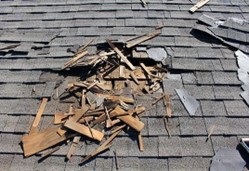 Roof Damage: The Haunting Above
Roof Damage: The Haunting Above
Your roof is your home’s first line of defense against the elements, but over time, it can suffer from wear and tear. Missing shingles, cracked tiles, or damaged flashing can all lead to leaks and water damage, which can quickly spread throughout your home.
Why It’s a Problem
Roof leaks can result in serious problems, including mold growth, water damage, and structural issues if left unaddressed. Additionally, roof damage can worsen during storms, often leading to expensive emergency repairs that could have been avoided with timely maintenance.
Prevention Tips
To maintain your roof’s integrity, it’s important to have it inspected at least once a year and following major storms. Promptly replacing any missing or damaged shingles can prevent water infiltration, while regularly cleaning your gutters will help avoid water buildup and ensure proper drainage, safeguarding your home from potential damage.
Sewer Backup: The Foul Phantom
A sewer backup is a homeowner’s worst nightmare. Not only does it create a foul mess, but it can also cause significant damage to your home’s plumbing system and lead to health hazards from bacteria and mold.
Why It’s a Problem
Sewer backups can lead to significant water damage, unpleasant odors, and health risks due to bacteria and mold exposure. Additionally, repairing these backups can be costly and may take days or even weeks to fully resolve, making it crucial to address any signs of trouble promptly.
Prevention Tips
To prevent sewer line issues, avoid pouring grease, oil, or food scraps down your drains, as these substances can lead to clogs. It’s also advisable to have your sewer line inspected and cleaned regularly, particularly if you reside in an older home.
Additionally, installing a backwater valve can help prevent sewage from backing up into your home during heavy rains, protecting your living space from potential damage.
Don’t Let Your Home Become a Haunted House!
Homeownership comes with its share of responsibilities, and regular maintenance is key to avoiding the costly and dangerous defects that could turn your home into a real-life haunted house. Whether it’s mold creeping through the walls, pests chewing away at the foundation, or electrical hazards sparking a fire, addressing these issues early can save you a lot of trouble in the long run. Stay vigilant, invest in regular inspections, and take preventive measures to keep your home safe and sound—no ghost stories required.
For expert help and peace of mind, contact Pro Inspect Solutions today to schedule your home inspection. Let us help you protect your home and keep it a safe haven for you and your family!

